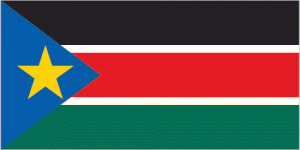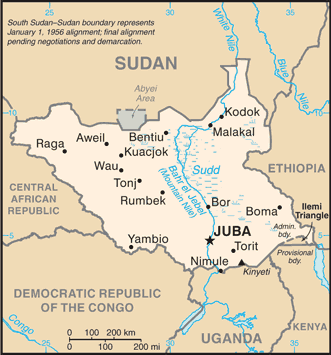South Sudan
Capital: Juba
Pray:
- Pray for the Aglow groups and leaders to be strengthened.
- Pray for all the resources and creativity needed to fulfill the intentions of God in the nation of South Sudan.
- Pray for the Aglow prayer group in the Capital city.
- Pray for godly government leaders. Blessed is the nation whose God is The Lord, the people whom He has chosen for His own inheritance. Psalm 33:12
Proclaim:
- Arise, shine; for your light has come! And the glory of the LORD is risen upon you. For behold, the darkness shall cover the earth, and deep darkness the people; but the LORD will arise over you, and His glory will be seen upon you. Isaiah 60:1,2 (NKJV)
- Lift up your heads, O you gates! Lift up, you everlasting doors! And the King of glory shall come in. Who is this King of glory? The Lord of hosts, He is he King of glory. Selah Psalm 24:9-10 (NKJV)
Interesting Facts About South Sudan
 Background: British explorer Samuel BAKER established the colony of Equatoria in 1870, in the name of the Ottoman Khedive of Egypt who claimed the territory. Headquartered in Gondokoro (near modern day Juba), Equatoria in theory composed most of what is now South Sudan. After being cut off from colonial administration during the Mahdist War from 1885-1898, Equatoria was made a state under the Anglo-Egyptian condominium in 1899. It was largely left to itself over the following decades, but Christian missionaries converted much of the population and facilitated the spread of English, rather than Arabic. Equatoria was ruled by British colonial administrators separately from what is now Sudan until the two colonies were combined at the 1947 Juba Conference, as part of British plans to prepare the region for independence. When Sudan gained its independence in 1956, it was with the understanding that the southerners would be able to participate fully in the political system. When the Arab Khartoum government reneged on its promises, a mutiny began that led to two prolonged periods of conflict (1955-1972 and 1983-2005) in which perhaps 2.5 million people died – mostly civilians – due to starvation and drought. Ongoing peace talks finally resulted in a Comprehensive Peace Agreement, signed in January 2005. As part of this agreement, the south was granted a six-year period of autonomy to be followed by a referendum on final status. The result of this referendum, held in January 2011, was a vote of 98% in favor of secession.
Background: British explorer Samuel BAKER established the colony of Equatoria in 1870, in the name of the Ottoman Khedive of Egypt who claimed the territory. Headquartered in Gondokoro (near modern day Juba), Equatoria in theory composed most of what is now South Sudan. After being cut off from colonial administration during the Mahdist War from 1885-1898, Equatoria was made a state under the Anglo-Egyptian condominium in 1899. It was largely left to itself over the following decades, but Christian missionaries converted much of the population and facilitated the spread of English, rather than Arabic. Equatoria was ruled by British colonial administrators separately from what is now Sudan until the two colonies were combined at the 1947 Juba Conference, as part of British plans to prepare the region for independence. When Sudan gained its independence in 1956, it was with the understanding that the southerners would be able to participate fully in the political system. When the Arab Khartoum government reneged on its promises, a mutiny began that led to two prolonged periods of conflict (1955-1972 and 1983-2005) in which perhaps 2.5 million people died – mostly civilians – due to starvation and drought. Ongoing peace talks finally resulted in a Comprehensive Peace Agreement, signed in January 2005. As part of this agreement, the south was granted a six-year period of autonomy to be followed by a referendum on final status. The result of this referendum, held in January 2011, was a vote of 98% in favor of secession.
Since independence on 9 July 2011, South Sudan has struggled with good governance and nation building and has attempted to control opposition forces operating in its territory. Economic conditions have deteriorated since January 2012 when the government decided to shut down oil production following bilateral disagreements with Sudan. In December 2013, conflict between government and opposition forces killed tens of thousands and led to a dire humanitarian crisis with millions of South Sudanese displaced and food insecure. The warring parties signed a peace agreement in August 2015 that created a transitional government of national unity in April 2016. However, in July 2016, fighting broke out in Juba between the two principal signatories, plunging the country back into conflict. A “revitalized” peace agreement was signed in September 2018 ending the fighting. Under the agreement, the government and various rebel groups agreed that the sides would form a unified national army and create a transitional government by May 2019. The agreement was extended until November 2019 and then subsequently to February 2020. However, implementation has been stalled, in part by a failure to agree on the country’s internal political boundaries.
Government Type: presidential republic
Population: 10,984,074 (July 2021 est.)
Ethnic Groups: Dinka (Jieng) 35.8%, Nuer (Naath) 15.6%, Shilluk (Chollo), Azande, Bari, Kakwa, Kuku, Murle, Mandari, Didinga, Ndogo, Bviri, Lndi, Anuak, Bongo, Lango, Dungotona, Acholi, Baka, Fertit (2011 est.)
Languages: English (official), Arabic (includes Juba and Sudanese variants), regional languages include Dinka, Nuer, Bari, Zande, Shilluk
Religions: animist, Christian, Muslim
Interesting Facts information from the cia.gov website. Read more about South Sudan


I have been prophesying over all nations, all nations’ capitals, and now all leaders of nations. This post was given on Feb. 24th, 2015. You can view it, and other posts on the blog by typing “Sudan” in the “search” window. We are now praying for you and hope that whoever reads this word will be encouraged. We found out about your troubles last night in a prayer meeting with some Kenyans. God’s blessings and will come forth and use you mightily. In Jesus’ Name
Kent. R. DaVault
Juba
If the world has passed you by, don’t cry.
If the princes don’t watch you, don’t sigh.
I alone have a bigger life, so high.
Come to me now, just try.
The sounds and dust of your city are old, very old. Change comes slow, but change is coming. Forces are amassing and they will spill over onto you. Violence is in their hearts and their teeth desire to gnash on you. Look now, for a storm from the west is forming to drive away the usurpers. As they jostle for position to feed on you, they will be overtaken and consumed. Where does this wind come from? Where does it go? This is my picture to you of those who are led of the Spirit, and I say that it’s my will for you. Your desire for the modern will undo you, but there are older voices that have been warning you. A very ancient voice is now speaking, deep within you. You were not made a capital for no reason. When the tribes needed to talk and make agreement, they came. Now, the lion of the tribe of Judah comes to you. Brew tea in your heart and prepare for his entrance into your tent. By the time he finishes, you will be new.